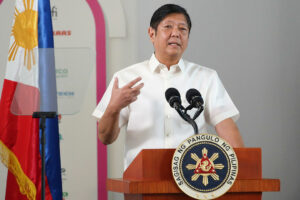Marcos gets failing mark from analysts; businessmen disagree

By Kyle Aristophere T. Atienza and Revin Mikhael D. Ochave, Reportersand Matthew Carl L. Montecillo
PHILIPPINE President Ferdinand R. Marcos, Jr. failed to lay down a program to help the poor and use his political capital to reform the government in his first 100 days, economists and political analysts said on Sunday.
“Marcos tried to portray himself as a busy, man-on-the-go president who is on top of the situation,” Leonardo A. Lanzona, who teaches economics at the Ateneo de Manila University, said in a Facebook Messenger chat. “This is all performative with no real performance to speak of.”
The economy is worse, which the government has blamed on external causes, he added.
Executive Secretary Lucas P. Bersamin did not immediately reply to a Viber message seeking comment.
“We don’t see any well-directed programs that can alleviate the situation of people most affected by the global economic recession and the aftermath of the pandemic,” Mr. Lanzona said, citing the need to boost jobs and agricultural output.
Economic recovery is at risk from spiraling costs and the battered peso, which fell to a record last week.
He said Mr. Marcos should have given up the Agriculture post to someone who can focus on the job, he said.
“This is all for show since he does not know a thing about production and distribution,” Mr. Lanzona said. “While this seemingly busy facade might be good for the ratings, it only botched up all our chances of a quick recovery.”
“The administration only managed to function in its first 100 days,” said Jan Robert R. Go, a political science professor at the University of the Philippines. “There was really nothing much.”
People would remember the president’s first 100 days for the sugar fiasco that led to his top aide quitting as executive secretary. He also failed to provide a clear vision for the country, Mr. Go said in a Messenger chat.
“For a presidential campaign that relied heavily on imaging, the president’s team failed in that aspect. We see officials resigning or being removed from office one after another,” he said. “This is not a good sign.”
The Marcos government had also failed to show that it’s on top of the country’s problems, Mr. Go said. “We are not expecting complete solutions, but a clearer plan or agenda must be laid out. People need work to fulfill their needs. This should be the focus of this administration.”
A survey by Pulse Asia Research, Inc. on Sept. 17 to 21 showed that 42% of Filipinos disapproved of the government’s handling of inflation, a problem that remained the top concern of Filipinos.
The lack of a clear agenda during his presidential campaign has led to uncertainties on both the economic and political fronts, said Philip Arnold “Randy” P. Tuaño, dean of the Ateneo School of Government.
‘LEADERSHIP IN DISARRAY’“The president’s failure to participate in election debates strengthened this perception,” he said in a Viber message. “The government needs to address the rising prices of food and fuel, address the gaps in pandemic response and providing employment.”
The resignation of his Cabinet officials showed that Mr. Marcos is not in control, Arjan P. Aguirre, a political science professor at the Ateneo, said in a Messenger chat. “It proves that the existence of in-fighting between forces or factions wanting to have better access to or control of important positions in the government.”
“What we are witnessing here is that a particular camp is getting the upper hand,” he added.
The resignation of Executive Secretary Victor D. Rodriguez, Press Secretary Trixie Cruz-Angeles and Commission on Audit Chairman Jose C. Calida “showed a national leadership in disarray,” said Terry L. Ridon, a public investment analyst and convenor of think tank InfraWatch PH.
“It reflects the political infighting among various groups within the Marcos Cabinet, which the president could not contain,” he said in Messenger chat, adding that it could affect his unity narrative.
He added the public does not care about the infighting and are more concerned about how he solves rising prices and poverty.
George T. Barcelon, Philippine Chamber of Commerce and Industry (PCCI) president, gave the president a passing mark for approving sugar imports and choosing the “right” Cabinet members.
“He set the direction of where he would like the country to be,” he said by telephone. “With the selection of the right Cabinet members, the business sector has been quite positive because these are people who have credentials.”
Mr. Marcos had passed policies to improve the country’s image as an investment destination, Francisco Alcuaz, Jr., executive director of the Makati Business Club, said in a Viber message.
“The main achievements in the business and economic space are amending the Build-Operate-Transfer Law implementing rules and regulations and giving business process outsourcing firms the flexibility in remote work,” he said.




![Photo of [B-SIDE Podcast] Moving to the cloud, towards sustainability and resiliency](https://redstateinvestings.com/wp-content/uploads/2021/11/10.25.21-B_Side_Varghese-1400x1400-1-QxyN9f-390x220.jpeg)